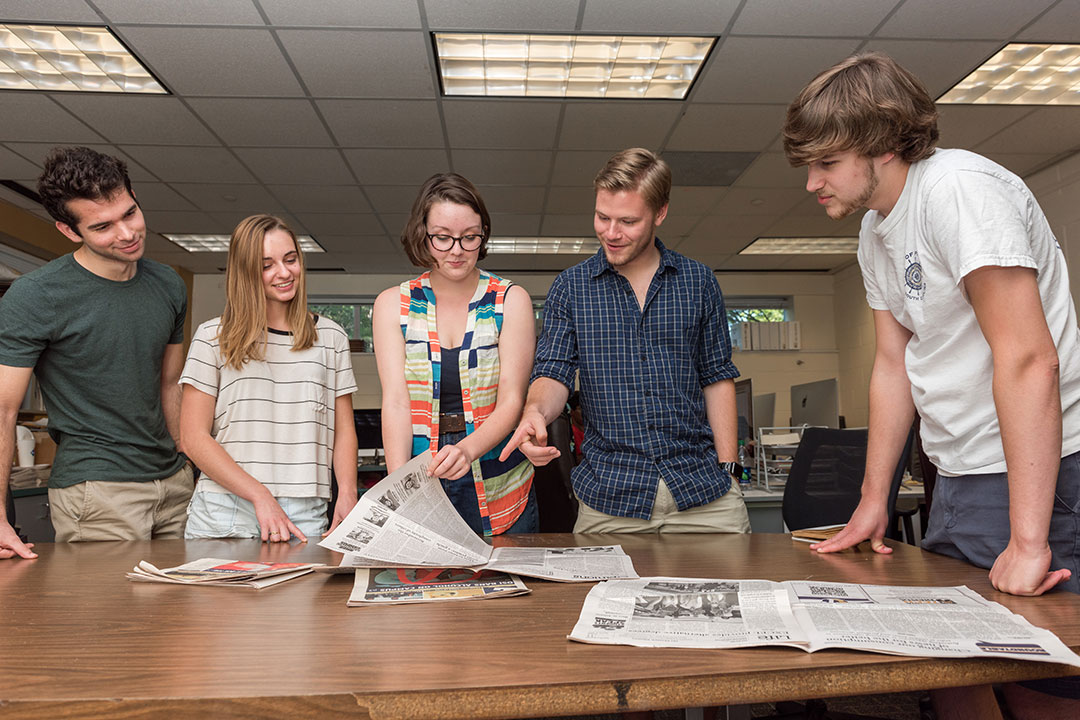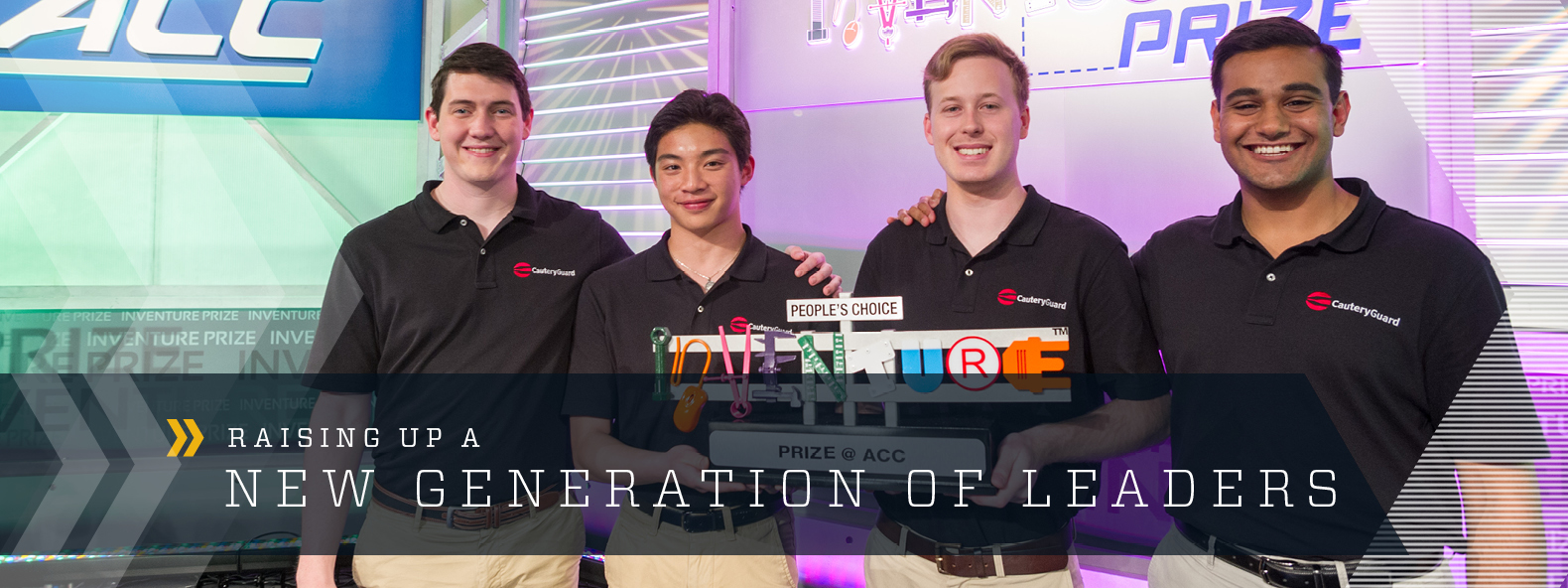
Annual Report 2017 Navigation
Raising Up a New Generation of Leaders
Solving real-world problems and improving the quality of life are the most compelling motivators for Georgia Tech students — and the prestigious honors they routinely receive reflect those priorities.
STUDENT ACHIEVEMENTS AND ACCOLADES
CauteryGuard Seals the Deal
A safer medical device used to remove unwanted tissue and to stop bleeding won Georgia Tech’s 2017 InVenture Prize.
The four biomedical engineering students behind CauteryGuard redesigned an electrocautery device by adding a retractable tip. This change prevents the risk of burns many doctors and patients face from the device’s exposed tip. It also eliminates the chance of fires in operating rooms because an exposed tip could come into contact with flammable materials.
The team won $20,000 plus a free patent filing and a spot in Flashpoint, a Georgia Tech accelerator. They also won the $5,000 People’s Choice Award, which went to the fans’ favorite invention. (CauteryGuard also won the People’s Choice Award at the ACC InVenture Prize competition held on campus several weeks after the Georgia Tech event.)
“This is really incredible,” said Dev Mandavia, a student in Georgia Tech’s Coulter Department of Biomedical Engineering. “This validates all the hard work we’ve put into this device. This will allow us to take it to the next step and bring our product to FDA approval and then eventually start saving the lives of patients and surgeons.”
In addition to Mandavia, the other team members are Jack Corelli, Hunter Hatcher, and Devin Li.
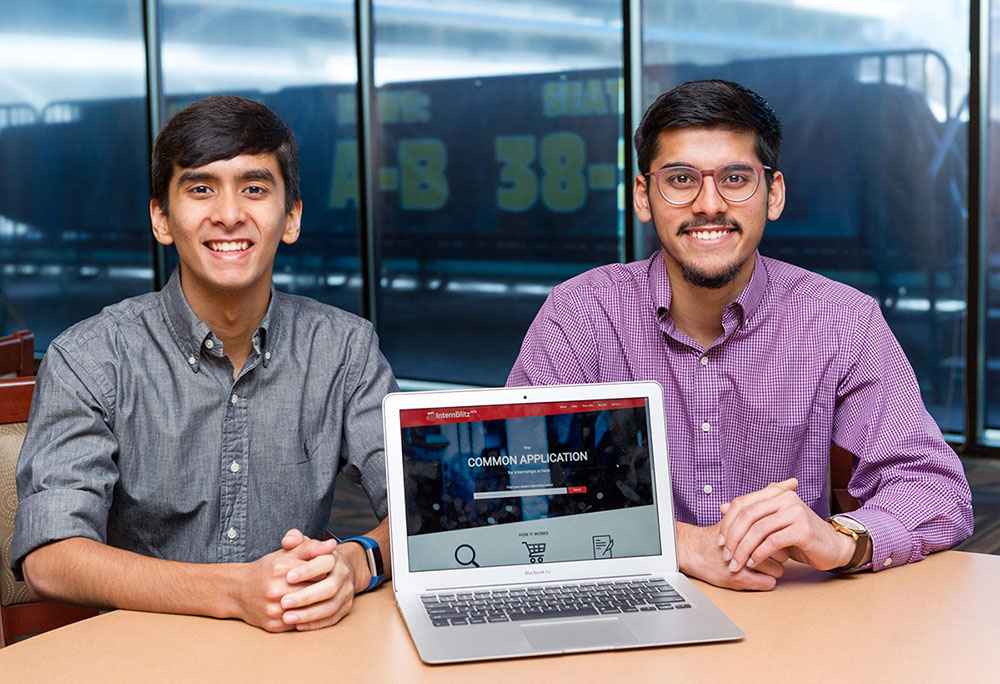
The inventors of InternBlitz: Murtaza Bambot, an industrial engineering major, and Nathan Dass, a computer science major.
The two-member team of InternBlitz earned second place, which comes with $10,000, a free patent filing, and a spot in Flashpoint.
InternBlitz streamlines the internship application process. It finds internships for students, automatically fills in their personal contact information and resume, and then sends applicants the extra, company-specific questions.
The inventors are Murtaza Bambot, an industrial engineering major, and Nathan Dass, a computer science major.
The annual InVenture Prize brings together student innovators from all academic backgrounds across campus in an effort to foster creativity, invention, and entrepreneurship.
The first ever Collegiate Drone National Championship, held at Purdue University. Photo by Trevor Mahlmann.
Engineering Students Win Drone Racing National Championship
Three engineering students took home the top trophy at the Collegiate Drone Racing National Championship held at Purdue University last spring. This was the first year a national championship had been organized for pilots of unmanned aircraft to compete against each other at the college level.
Twenty-seven universities fielded teams of pilots who navigated obstacle courses flying custom-designed drones. The course was designed for testing both a pilot’s speed and precision.
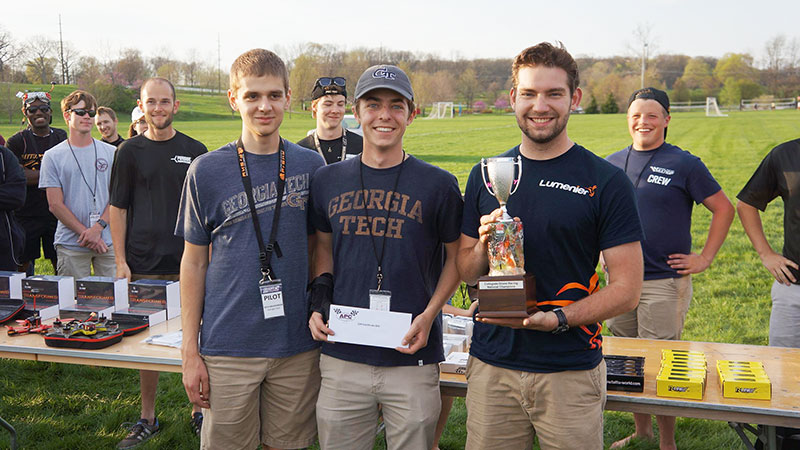
Georgia Tech students Seth Ableidinger, Davis Engleman, and Nick Willard bring home the first place trophy from the first-ever Collegiate Drone Racing National Championship held at Purdue University.
The Georgia Tech team was led by aerospace engineering major Nick Willard, who flew in the final race to seal the victory. Willard competes in many non-collegiate Drone Racing League events, and has won racing events televised on ESPN. He is affectionately known by drone racing enthusiasts as “Wild Willy.”
Willard was joined by Seth Ableidinger and Davis Engelman, two mechanical engineering majors, who held strong in preliminary races to put Georgia Tech into a solid lead.
Their times and rankings, combined with Willard’s, put Georgia Tech into first place among the field. The team brought home a total of $15,000 in equipment and prizes.
The University of California, Berkeley finished second, with Embry-Riddle Aeronautical University in third, and host Purdue University coming in fourth.
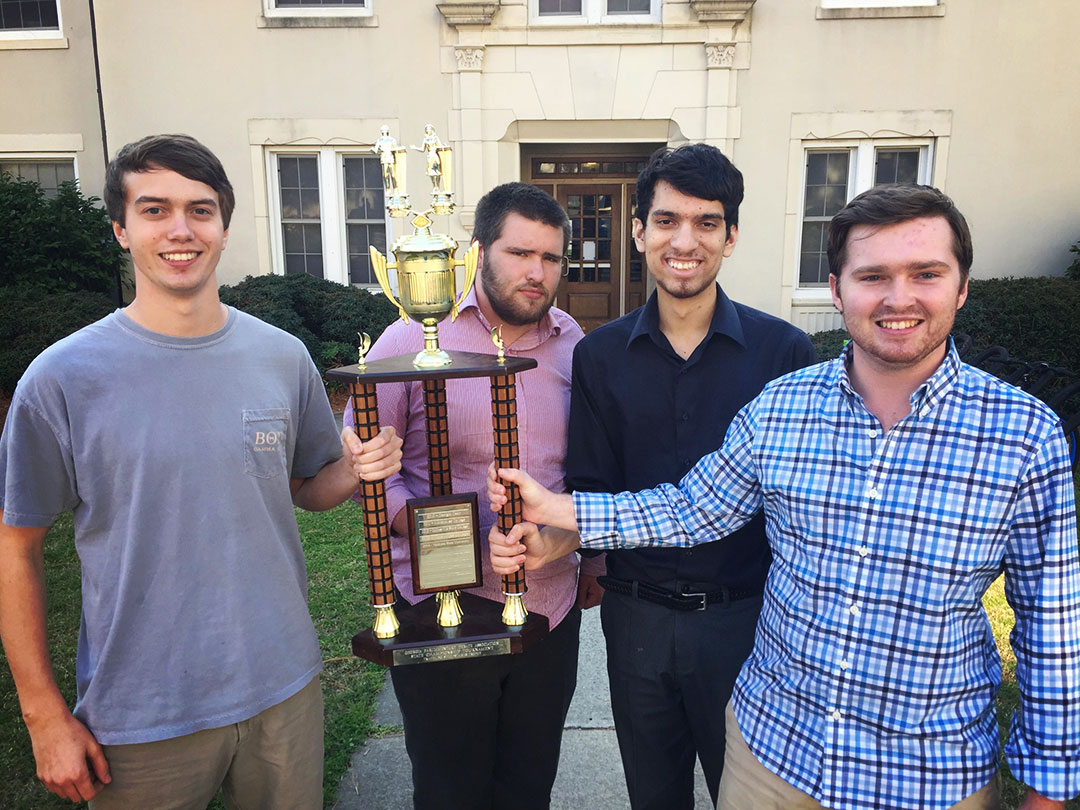
In addition to winning the Georgia Collegiate Varsity Debate Championship, the debate team (consisting of, left to right, Jason Floyd, John Golden, Hasan Qadri, and Andrew Huot) also placed third in the ACC Coastal Division tournament.
Debate Team Wins State Championship
Georgia Tech’s debate team emerged the overall winner (with the most cumulative points) at the Georgia Collegiate Varsity Debate Championship.
During the competition, the teams debated immigration status as a criterion for federal funds, federal government investments in space systems, bridging the racial divide, plans to counter climate change, and the merits of violent vs. nonviolent protest.
“Georgia Tech’s debate team proved that you can be a helluva engineer and a helluva debater.”
Andrew Huot
“I think it’s notable that college students are moving beyond social media to have a constructive discourse over issues in the currently tumultuous political climate,” said Andrew Huot, vice president of Tech’s debate team. “All of these topics are important for college students to engage, and Georgia Tech’s debate team proved that you can be a helluva engineer and a helluva debater.”
This year’s championship follows a period of several years in which the Institute did not have a debate team. Huot and fellow industrial engineering student Jason Floyd found there was student interest in debate, so they took the lead and re-established the club in 2016. The team doesn’t have a paid coach or an established program.
“Most debate teams come from liberal arts universities and use broad claims and vague rhetoric to debate,” Huot said. “We debate using a technical scientific approach characteristic of Georgia Tech. The best example was the climate change topic, where our competitor, Mercer University, used broad arguments about the merits of green energy, whereas Tech argued for the installation of a space-based solar power collection system, for which we had cost and energy output estimates and specific mechanisms within NASA to put the plan into effect.”
STUDENT RESOURCES AND SUPPORT
Center for Student Diversity and Inclusion
In an effort to strengthen the services that support the success of underrepresented minority and women students at Georgia Tech, a new center is both centralizing current programs and expanding its reach with new ones.
The Center for Student Diversity and Inclusion was launched last year to provide more programs and pathways to success for underrepresented students on campus. As part of Institute Diversity, the Center for Student Diversity and Inclusion encourages students to excel academically, interact across cultures and perspectives, and value inclusion.
The purpose of the Center for Student Diversity and Inclusion is to serve students from all backgrounds and encourage them to be inventive leaders who think globally. The Center aims to be a positive, enriching environment that connects students, faculty, staff, alumni, and community stakeholders through effective programs, projects, networks, and research.
S. Gordon Moore Jr., executive director of Student Diversity and Inclusion, serves as the director of the new Center.
“One of the findings from Georgia Tech’s Climate Assessment Survey expressed feelings of marginalization by gender, race, and ethnicity among undergraduate and graduate students,” said Moore. “By launching the Center for Student Diversity and Inclusion, we will better serve the more than 4,000 students who benefit from our programs now — and increase capacity to serve even more current and future students.”
Focusing on the recruitment, retention, and advancement of underrepresented minority and women students, the Center for Student Diversity and Inclusion houses the Office of Hispanic Initiatives, OMED (Office of Minority Educational Development): Educational Services, and the Center for the Study of Women, Science, and Technology.
“I am excited to see how the Center for Student Diversity and Inclusion can create synergy among units in sharing resources, insights, and connections to help increase the diversity of our student population,” said Auston Kennedy, an undergraduate student in the Stewart School of Industrial and Systems Engineering.
Black Student Experience Task Force Issues Implementation Update
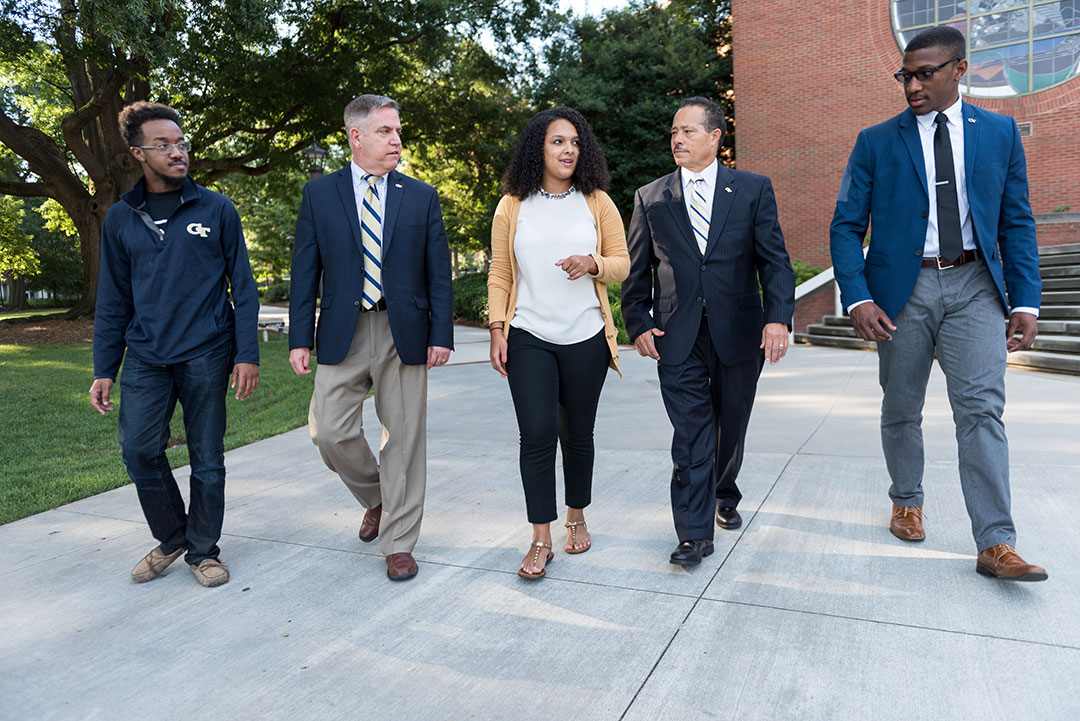
Several members of the implementation committee — Henderson Johnson II, Vice President for Student Life and Dean of Students John M. Stein, Morgan Foreman, Vice President for Institute Diversity Archie Ervin, and Nelson Raphael — discuss progress on the 11 recommendations from the Black Student Experience Task Force that will help ensure a welcoming, inclusive campus.
The implementation committee of students and leaders from Institute Diversity, the Office of the Provost, Student Life, and Undergraduate Education announced updates on the committee’s progress in addressing the 11 recommendations from the Black Student Experience Task Force that will help ensure a welcoming, inclusive campus.
As part of a three-year process, implementation of the 11 recommendations started in August 2016. These recommendations are grouped into four categories: programs, trainings, physical spaces, and planning and assessments.
“After discussing with the committee, we expanded the implementation of two areas from the original 11 recommendations of the Black Student Experience Task Force — Challenge and FASET,” said Archie Ervin, vice president for Institute Diversity. “The implementation committee identified broader and more long-term academic issue areas beyond the Challenge program and orientation processes beyond the FASET program as it relates to diversity, equity, and inclusion.”
These implementation updates (not ranked by priority) encompass:
- Academic Programs
- Orientation
- Intercultural Student Programs
- Reporting System for Incidents of Discrimination
- Community Orientation and Training
- Cultural Inclusivity Leadership Training
- Greek Education
- Multicultural Center (part of the Student Center expansion)
- Strategic Plan Initiatives
- Campus Climate Assessment
- Institutional Climate Change and Growth
“Although not visible to the campus community yet, there has been a sustained amount of background, foundational work from the implementation committee to move forward on the recommendations from the Black Student Experience Task Force report,” said John Stein, dean of students and vice president for Student Life. “I appreciate and applaud the work of the committee, and we look forward to the campus community experiencing these recommendations and seeing the positive changes in an effort to further advance a culture of close collaboration, global perspective, and intercultural respect at Tech.”
American Talent Initiative Working to Make College More Affordable
Georgia Tech is collaborating with 29 other universities across the country to help more students from lower-income families earn a college degree.
The new American Talent Initiative (ATI) allows the country’s most respected public and private higher education institutions to share strategies to substantially increase the number of talented students from low- and moderate-income families who successfully complete college. The founding members seek to attract, enroll, and graduate the most qualified students, regardless of family income. They will also contribute to research that will help other colleges graduate more high-achieving, lower-income students.
The initiative is supported by Bloomberg Philanthropies and was created with a national goal of educating 50,000 additional high-achieving, lower-income students at the 270 colleges and universities with the highest graduation rates by 2025.
“At Georgia Tech we seek to recruit the nation’s most talented students, and an initiative like ATI helps improve college access.”
Rick Clark
For Georgia Tech, the new alliance builds on other initiatives improving college graduation rates, especially among underrepresented students. The Institute is the only public college in Georgia currently participating in this collaborative effort.
“Georgia Tech is proud to partner with the American Talent Initiative and looks forward to participating in this nationwide collaboration addressing access and affordability for some of the country’s best and brightest students,” President G.P. “Bud” Peterson said. “This initiative is entirely consistent with the state of Georgia’s efforts to increase the number of college graduates through the Complete College Georgia initiative. Through a sharing of ideas, both of these initiatives provide a great opportunity to impact the lives of many students across the state and maximize their potential.”
“At Georgia Tech we seek to recruit the nation’s most talented students, and an initiative like ATI helps improve college access,” said Director of Undergraduate Admission Rick Clark. “Improving socioeconomic diversity starts with outreach. For example, we have mailed a planning for college booklet to low-income sophomores and juniors that helps them think through their college choices, as well as other critical information on admission and financial aid resources.”
ATI expects to add more top-performing colleges every year to join Tech and the other founding members.
Student-focused Philanthropy Makes Significant Impact
Opportunities for students to gain invaluable entrepreneurship-related experience will dramatically increase as the result of an anonymous donor’s $30 million commitment designated for student entrepreneurship at Georgia Tech. The endowment comes with but one stipulation – that it be used for “programs, activities, and initiatives designed to advance entrepreneurship in the student body...”
The program that piqued the donor’s interest the most is CREATE-X — flourishing in no small part thanks to its first philanthropic fan, Chris Klaus, former Georgia Tech student, founder of one of the first internet security companies, ISS, and social gaming company Kaneva, and namesake of the Institute’s Klaus Advanced Computing Building.
This new $30 million commitment is a “tremendous leap forward to help the Institute achieve its ultimate vision,” says Rafael L. Bras, provost and executive vice president of Academic Affairs and K. Harrison Brown Family Chair. “We are very excited about the opportunities that the funds from this endowment will open up, both near- and long-term — they will bridge much of the gap between where we are and where we hope to go in building entrepreneurial confidence at Georgia Tech.”
Annual Report 2017 Navigation
(text and background only visible when logged in)

